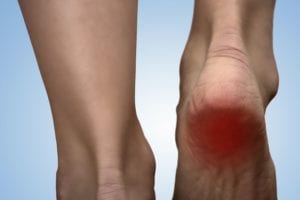If you’ve been struggling with pain or swelling in your heel, it’s a good bet that you have heel spurs. Newtown Foot and Ankle Specialists, a foot and ankle specialist in Newtown, PA, often deals with patients that have heel spurs. Our experienced providers answer the frequently asked questions we see involving this condition.
Heel Spur Frequently Asked Questions
Question: What exactly are heel spurs?
Answer: Heel spurs are caused by calcium deposits that build up in your heel. They’re bony growths and they end up shaped like a hook. This causes you a lot of pain, particularly to stand and walk.
Question: Why do I have heel spurs?
Answer: There are some habits and conditions that can make you more likely to develop heel spurs. This is because they’re usually caused by strain on the muscles and ligaments in your feet. It leads you to feel pain when you’re walking and running, and it may be worse after a long period of rest or a lot of walking. The habits and conditions that can make you more prone include:
- Flat feet or high arches
- Standing for a long period of time
- Shoes that don’t fit well
- Running on hard surfaces
- Frequently putting a lot of weight on the bone of the heel
Question: I thought my pain was plantar fasciitis. Is this not the same?
Answer: No, they’re two different conditions. Plantar fasciitis is a condition where there’s inflammation in the tissue on the underside of your foot. However, plantar fasciitis often comes with heel spurs. You may also encounter these other problems with your heel spurs:
- Arthritis
- Sports injuries
- Tendonitis
- Inflammatory issues
All of these problems can come with heel spurs. This is why it’s essential to make sure you get checked out by your Newtown, PA foot and ankle specialist. There could be multiple conditions that are causing your foot pain.
Question: How can I get treatment for my heel spurs?
Answer: There are many forms of treatment that can help your heel spurs. But first, one of our specialists will do a full consultation with you. They’ll review your medical history, talk to you about your symptoms and issues, and determine what treatment plan is right for you.
Commonly, you can use shoe inserts and physical therapy stretches to heal mild cases of heel spurs. You may also need cortisone injections, prescription anti-inflammatory medication, or night splints. If it’s an extremely severe case, surgery may be required. This will be to remove heel spurs as well as the tissues that cause plantar fasciitis.
Your Foot and Ankle Specialist in Newtown, Pennsylvania
If you’re struggling with heel pain, don’t wait any longer to seek out treatment. Call us today or schedule an appointment online.
